Orientalism and Occidentalism: Exploring Power Dynamics and Ideologies
VerifiedAdded on 2023/01/17
|20
|6814
|42
Essay
AI Summary
This essay provides an in-depth analysis of Orientalism and Occidentalism, exploring the complex relationship between the East and the West. It begins by defining these terms and their historical context, emphasizing the power dynamics and stereotypes inherent in Orientalist perspectives. The essay delves into Edward Said's influential work on Orientalism, discussing his critique of Western representations of the Orient and the concept of the 'Other.' It also examines the evolution of Orientalism, from ancient Greece to the modern era, including the rise of neo-Orientalism in the context of contemporary global politics and media. The essay explores the impact of Orientalism on cultural representations, political discourse, and the shaping of identities, highlighting the importance of understanding these concepts for a critical analysis of global power structures and cultural exchange. Furthermore, the essay discusses the evolution of Orientalism, the role of various actors, and the emergence of neo-Orientalism, particularly in the context of the 'war on terror' and Islamophobia. The conclusion emphasizes the ongoing relevance of these concepts in understanding contemporary global dynamics and power relations.
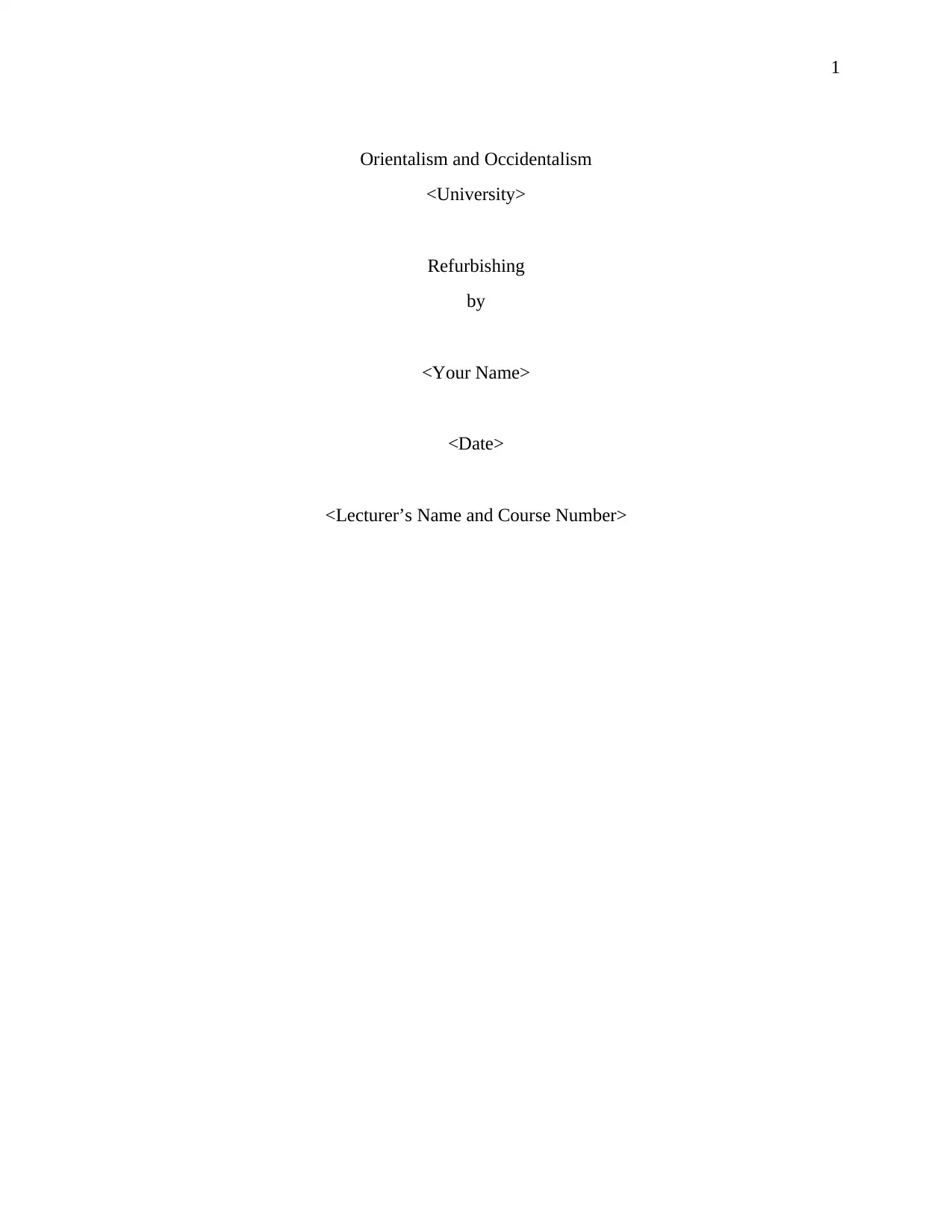
1
Orientalism and Occidentalism
<University>
Refurbishing
by
<Your Name>
<Date>
<Lecturer’s Name and Course Number>
Orientalism and Occidentalism
<University>
Refurbishing
by
<Your Name>
<Date>
<Lecturer’s Name and Course Number>
Paraphrase This Document
Need a fresh take? Get an instant paraphrase of this document with our AI Paraphraser
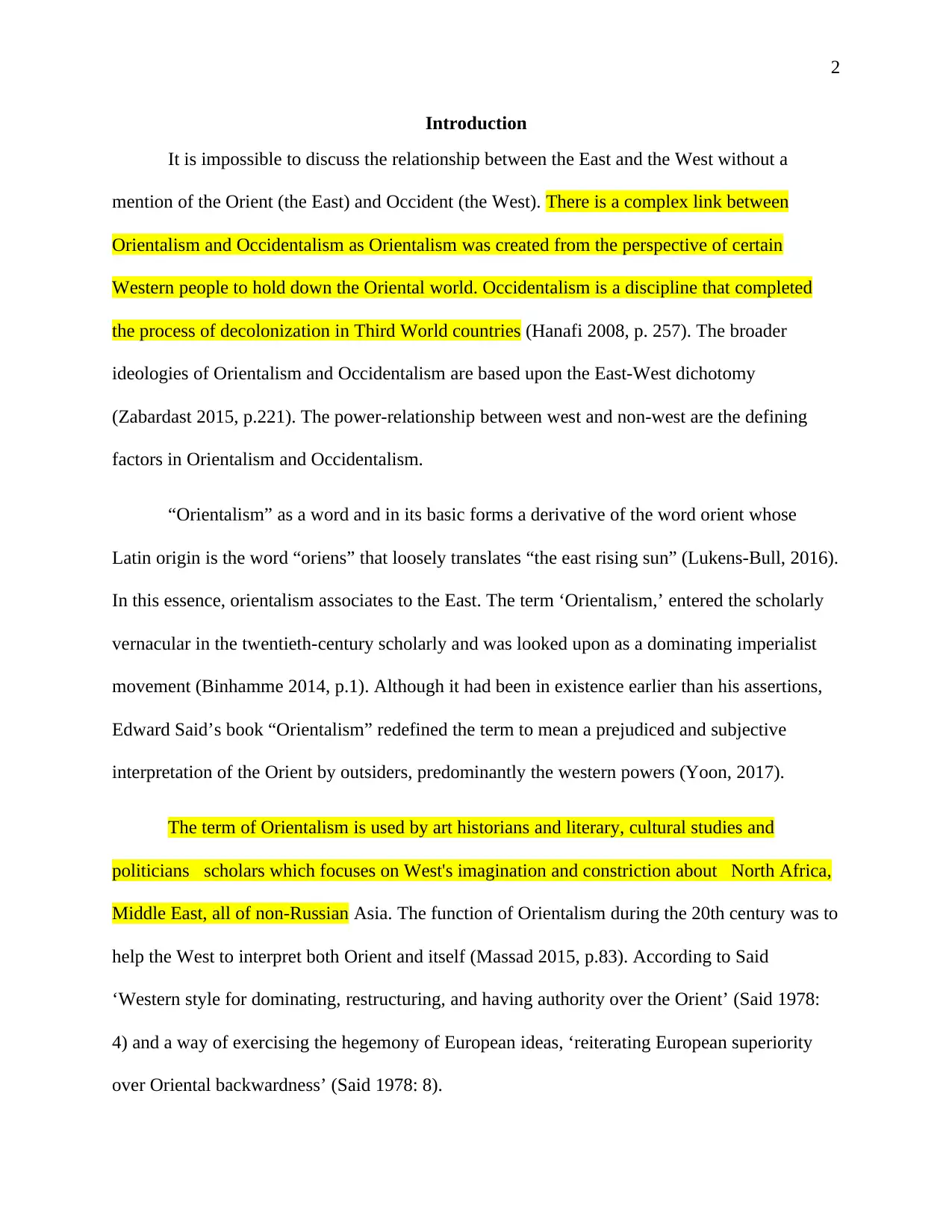
2
Introduction
It is impossible to discuss the relationship between the East and the West without a
mention of the Orient (the East) and Occident (the West). There is a complex link between
Orientalism and Occidentalism as Orientalism was created from the perspective of certain
Western people to hold down the Oriental world. Occidentalism is a discipline that completed
the process of decolonization in Third World countries (Hanafi 2008, p. 257). The broader
ideologies of Orientalism and Occidentalism are based upon the East-West dichotomy
(Zabardast 2015, p.221). The power-relationship between west and non-west are the defining
factors in Orientalism and Occidentalism.
“Orientalism” as a word and in its basic forms a derivative of the word orient whose
Latin origin is the word “oriens” that loosely translates “the east rising sun” (Lukens-Bull, 2016).
In this essence, orientalism associates to the East. The term ‘Orientalism,’ entered the scholarly
vernacular in the twentieth-century scholarly and was looked upon as a dominating imperialist
movement (Binhamme 2014, p.1). Although it had been in existence earlier than his assertions,
Edward Said’s book “Orientalism” redefined the term to mean a prejudiced and subjective
interpretation of the Orient by outsiders, predominantly the western powers (Yoon, 2017).
The term of Orientalism is used by art historians and literary, cultural studies and
politicians scholars which focuses on West's imagination and constriction about North Africa,
Middle East, all of non-Russian Asia. The function of Orientalism during the 20th century was to
help the West to interpret both Orient and itself (Massad 2015, p.83). According to Said
‘Western style for dominating, restructuring, and having authority over the Orient’ (Said 1978:
4) and a way of exercising the hegemony of European ideas, ‘reiterating European superiority
over Oriental backwardness’ (Said 1978: 8).
Introduction
It is impossible to discuss the relationship between the East and the West without a
mention of the Orient (the East) and Occident (the West). There is a complex link between
Orientalism and Occidentalism as Orientalism was created from the perspective of certain
Western people to hold down the Oriental world. Occidentalism is a discipline that completed
the process of decolonization in Third World countries (Hanafi 2008, p. 257). The broader
ideologies of Orientalism and Occidentalism are based upon the East-West dichotomy
(Zabardast 2015, p.221). The power-relationship between west and non-west are the defining
factors in Orientalism and Occidentalism.
“Orientalism” as a word and in its basic forms a derivative of the word orient whose
Latin origin is the word “oriens” that loosely translates “the east rising sun” (Lukens-Bull, 2016).
In this essence, orientalism associates to the East. The term ‘Orientalism,’ entered the scholarly
vernacular in the twentieth-century scholarly and was looked upon as a dominating imperialist
movement (Binhamme 2014, p.1). Although it had been in existence earlier than his assertions,
Edward Said’s book “Orientalism” redefined the term to mean a prejudiced and subjective
interpretation of the Orient by outsiders, predominantly the western powers (Yoon, 2017).
The term of Orientalism is used by art historians and literary, cultural studies and
politicians scholars which focuses on West's imagination and constriction about North Africa,
Middle East, all of non-Russian Asia. The function of Orientalism during the 20th century was to
help the West to interpret both Orient and itself (Massad 2015, p.83). According to Said
‘Western style for dominating, restructuring, and having authority over the Orient’ (Said 1978:
4) and a way of exercising the hegemony of European ideas, ‘reiterating European superiority
over Oriental backwardness’ (Said 1978: 8).
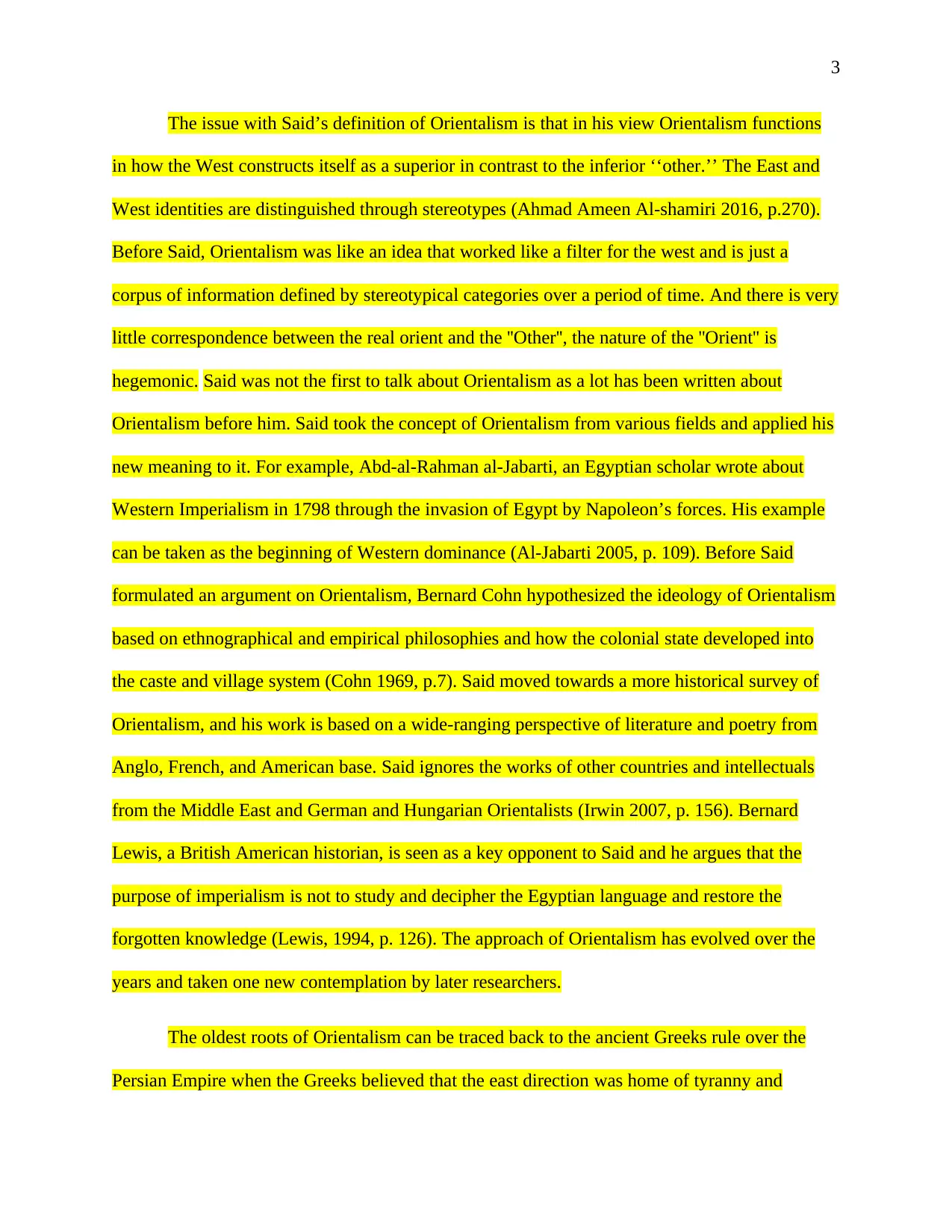
3
The issue with Said’s definition of Orientalism is that in his view Orientalism functions
in how the West constructs itself as a superior in contrast to the inferior ‘‘other.’’ The East and
West identities are distinguished through stereotypes (Ahmad Ameen Al-shamiri 2016, p.270).
Before Said, Orientalism was like an idea that worked like a filter for the west and is just a
corpus of information defined by stereotypical categories over a period of time. And there is very
little correspondence between the real orient and the ''Other'', the nature of the ''Orient'' is
hegemonic. Said was not the first to talk about Orientalism as a lot has been written about
Orientalism before him. Said took the concept of Orientalism from various fields and applied his
new meaning to it. For example, Abd-al-Rahman al-Jabarti, an Egyptian scholar wrote about
Western Imperialism in 1798 through the invasion of Egypt by Napoleon’s forces. His example
can be taken as the beginning of Western dominance (Al-Jabarti 2005, p. 109). Before Said
formulated an argument on Orientalism, Bernard Cohn hypothesized the ideology of Orientalism
based on ethnographical and empirical philosophies and how the colonial state developed into
the caste and village system (Cohn 1969, p.7). Said moved towards a more historical survey of
Orientalism, and his work is based on a wide-ranging perspective of literature and poetry from
Anglo, French, and American base. Said ignores the works of other countries and intellectuals
from the Middle East and German and Hungarian Orientalists (Irwin 2007, p. 156). Bernard
Lewis, a British American historian, is seen as a key opponent to Said and he argues that the
purpose of imperialism is not to study and decipher the Egyptian language and restore the
forgotten knowledge (Lewis, 1994, p. 126). The approach of Orientalism has evolved over the
years and taken one new contemplation by later researchers.
The oldest roots of Orientalism can be traced back to the ancient Greeks rule over the
Persian Empire when the Greeks believed that the east direction was home of tyranny and
The issue with Said’s definition of Orientalism is that in his view Orientalism functions
in how the West constructs itself as a superior in contrast to the inferior ‘‘other.’’ The East and
West identities are distinguished through stereotypes (Ahmad Ameen Al-shamiri 2016, p.270).
Before Said, Orientalism was like an idea that worked like a filter for the west and is just a
corpus of information defined by stereotypical categories over a period of time. And there is very
little correspondence between the real orient and the ''Other'', the nature of the ''Orient'' is
hegemonic. Said was not the first to talk about Orientalism as a lot has been written about
Orientalism before him. Said took the concept of Orientalism from various fields and applied his
new meaning to it. For example, Abd-al-Rahman al-Jabarti, an Egyptian scholar wrote about
Western Imperialism in 1798 through the invasion of Egypt by Napoleon’s forces. His example
can be taken as the beginning of Western dominance (Al-Jabarti 2005, p. 109). Before Said
formulated an argument on Orientalism, Bernard Cohn hypothesized the ideology of Orientalism
based on ethnographical and empirical philosophies and how the colonial state developed into
the caste and village system (Cohn 1969, p.7). Said moved towards a more historical survey of
Orientalism, and his work is based on a wide-ranging perspective of literature and poetry from
Anglo, French, and American base. Said ignores the works of other countries and intellectuals
from the Middle East and German and Hungarian Orientalists (Irwin 2007, p. 156). Bernard
Lewis, a British American historian, is seen as a key opponent to Said and he argues that the
purpose of imperialism is not to study and decipher the Egyptian language and restore the
forgotten knowledge (Lewis, 1994, p. 126). The approach of Orientalism has evolved over the
years and taken one new contemplation by later researchers.
The oldest roots of Orientalism can be traced back to the ancient Greeks rule over the
Persian Empire when the Greeks believed that the east direction was home of tyranny and
⊘ This is a preview!⊘
Do you want full access?
Subscribe today to unlock all pages.

Trusted by 1+ million students worldwide
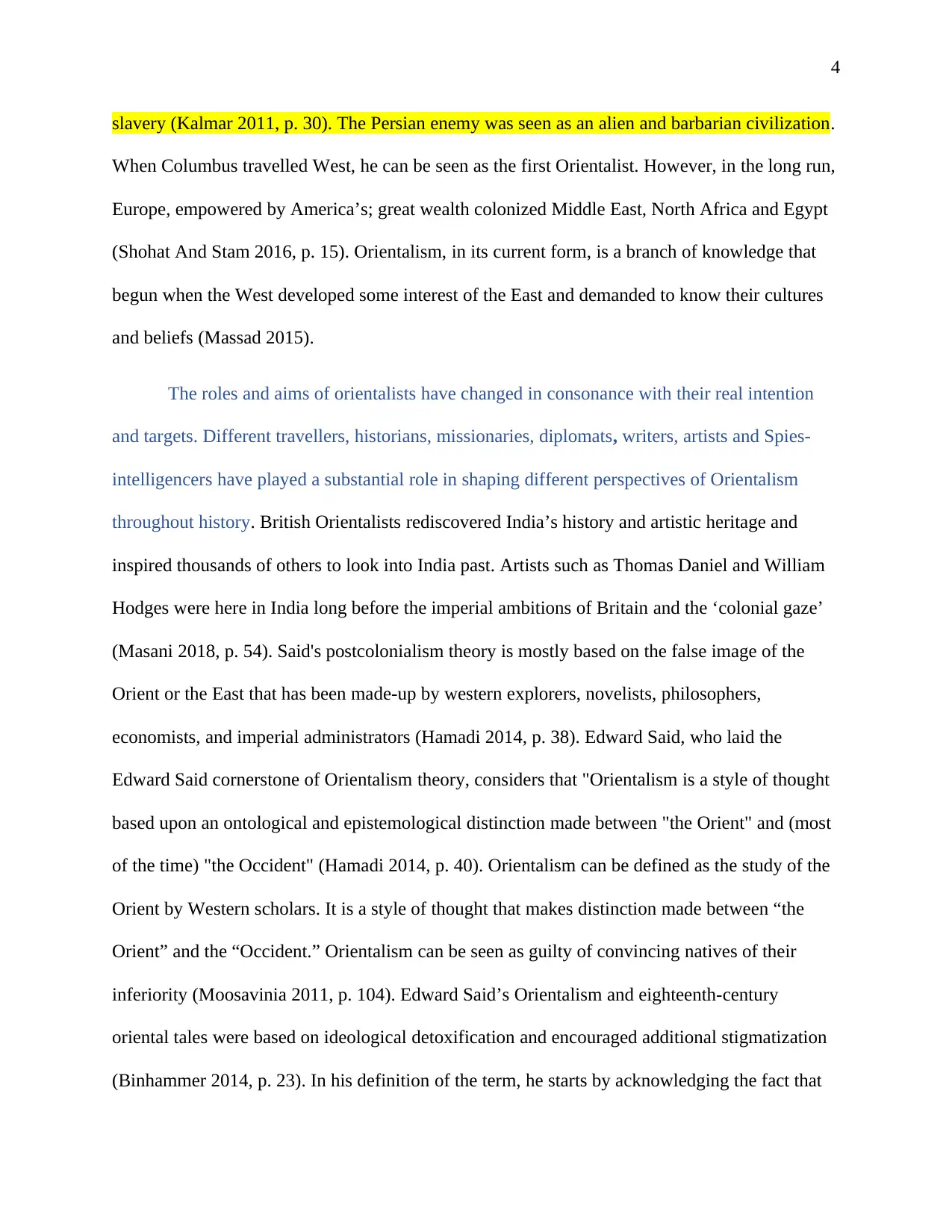
4
slavery (Kalmar 2011, p. 30). The Persian enemy was seen as an alien and barbarian civilization.
When Columbus travelled West, he can be seen as the first Orientalist. However, in the long run,
Europe, empowered by America’s; great wealth colonized Middle East, North Africa and Egypt
(Shohat And Stam 2016, p. 15). Orientalism, in its current form, is a branch of knowledge that
begun when the West developed some interest of the East and demanded to know their cultures
and beliefs (Massad 2015).
The roles and aims of orientalists have changed in consonance with their real intention
and targets. Different travellers, historians, missionaries, diplomats, writers, artists and Spies-
intelligencers have played a substantial role in shaping different perspectives of Orientalism
throughout history. British Orientalists rediscovered India’s history and artistic heritage and
inspired thousands of others to look into India past. Artists such as Thomas Daniel and William
Hodges were here in India long before the imperial ambitions of Britain and the ‘colonial gaze’
(Masani 2018, p. 54). Said's postcolonialism theory is mostly based on the false image of the
Orient or the East that has been made-up by western explorers, novelists, philosophers,
economists, and imperial administrators (Hamadi 2014, p. 38). Edward Said, who laid the
Edward Said cornerstone of Orientalism theory, considers that "Orientalism is a style of thought
based upon an ontological and epistemological distinction made between "the Orient" and (most
of the time) "the Occident" (Hamadi 2014, p. 40). Orientalism can be defined as the study of the
Orient by Western scholars. It is a style of thought that makes distinction made between “the
Orient” and the “Occident.” Orientalism can be seen as guilty of convincing natives of their
inferiority (Moosavinia 2011, p. 104). Edward Said’s Orientalism and eighteenth-century
oriental tales were based on ideological detoxification and encouraged additional stigmatization
(Binhammer 2014, p. 23). In his definition of the term, he starts by acknowledging the fact that
slavery (Kalmar 2011, p. 30). The Persian enemy was seen as an alien and barbarian civilization.
When Columbus travelled West, he can be seen as the first Orientalist. However, in the long run,
Europe, empowered by America’s; great wealth colonized Middle East, North Africa and Egypt
(Shohat And Stam 2016, p. 15). Orientalism, in its current form, is a branch of knowledge that
begun when the West developed some interest of the East and demanded to know their cultures
and beliefs (Massad 2015).
The roles and aims of orientalists have changed in consonance with their real intention
and targets. Different travellers, historians, missionaries, diplomats, writers, artists and Spies-
intelligencers have played a substantial role in shaping different perspectives of Orientalism
throughout history. British Orientalists rediscovered India’s history and artistic heritage and
inspired thousands of others to look into India past. Artists such as Thomas Daniel and William
Hodges were here in India long before the imperial ambitions of Britain and the ‘colonial gaze’
(Masani 2018, p. 54). Said's postcolonialism theory is mostly based on the false image of the
Orient or the East that has been made-up by western explorers, novelists, philosophers,
economists, and imperial administrators (Hamadi 2014, p. 38). Edward Said, who laid the
Edward Said cornerstone of Orientalism theory, considers that "Orientalism is a style of thought
based upon an ontological and epistemological distinction made between "the Orient" and (most
of the time) "the Occident" (Hamadi 2014, p. 40). Orientalism can be defined as the study of the
Orient by Western scholars. It is a style of thought that makes distinction made between “the
Orient” and the “Occident.” Orientalism can be seen as guilty of convincing natives of their
inferiority (Moosavinia 2011, p. 104). Edward Said’s Orientalism and eighteenth-century
oriental tales were based on ideological detoxification and encouraged additional stigmatization
(Binhammer 2014, p. 23). In his definition of the term, he starts by acknowledging the fact that
Paraphrase This Document
Need a fresh take? Get an instant paraphrase of this document with our AI Paraphraser
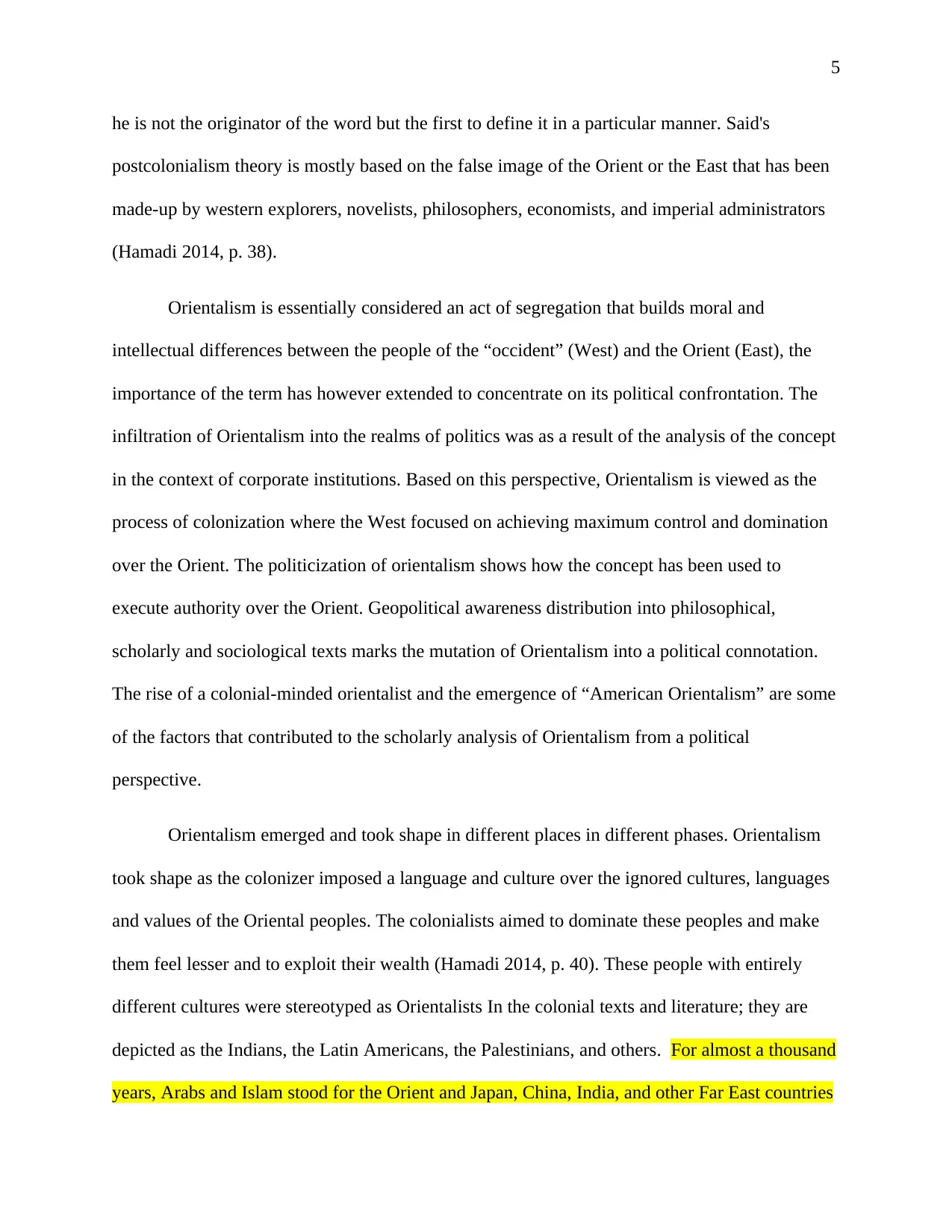
5
he is not the originator of the word but the first to define it in a particular manner. Said's
postcolonialism theory is mostly based on the false image of the Orient or the East that has been
made-up by western explorers, novelists, philosophers, economists, and imperial administrators
(Hamadi 2014, p. 38).
Orientalism is essentially considered an act of segregation that builds moral and
intellectual differences between the people of the “occident” (West) and the Orient (East), the
importance of the term has however extended to concentrate on its political confrontation. The
infiltration of Orientalism into the realms of politics was as a result of the analysis of the concept
in the context of corporate institutions. Based on this perspective, Orientalism is viewed as the
process of colonization where the West focused on achieving maximum control and domination
over the Orient. The politicization of orientalism shows how the concept has been used to
execute authority over the Orient. Geopolitical awareness distribution into philosophical,
scholarly and sociological texts marks the mutation of Orientalism into a political connotation.
The rise of a colonial-minded orientalist and the emergence of “American Orientalism” are some
of the factors that contributed to the scholarly analysis of Orientalism from a political
perspective.
Orientalism emerged and took shape in different places in different phases. Orientalism
took shape as the colonizer imposed a language and culture over the ignored cultures, languages
and values of the Oriental peoples. The colonialists aimed to dominate these peoples and make
them feel lesser and to exploit their wealth (Hamadi 2014, p. 40). These people with entirely
different cultures were stereotyped as Orientalists In the colonial texts and literature; they are
depicted as the Indians, the Latin Americans, the Palestinians, and others. For almost a thousand
years, Arabs and Islam stood for the Orient and Japan, China, India, and other Far East countries
he is not the originator of the word but the first to define it in a particular manner. Said's
postcolonialism theory is mostly based on the false image of the Orient or the East that has been
made-up by western explorers, novelists, philosophers, economists, and imperial administrators
(Hamadi 2014, p. 38).
Orientalism is essentially considered an act of segregation that builds moral and
intellectual differences between the people of the “occident” (West) and the Orient (East), the
importance of the term has however extended to concentrate on its political confrontation. The
infiltration of Orientalism into the realms of politics was as a result of the analysis of the concept
in the context of corporate institutions. Based on this perspective, Orientalism is viewed as the
process of colonization where the West focused on achieving maximum control and domination
over the Orient. The politicization of orientalism shows how the concept has been used to
execute authority over the Orient. Geopolitical awareness distribution into philosophical,
scholarly and sociological texts marks the mutation of Orientalism into a political connotation.
The rise of a colonial-minded orientalist and the emergence of “American Orientalism” are some
of the factors that contributed to the scholarly analysis of Orientalism from a political
perspective.
Orientalism emerged and took shape in different places in different phases. Orientalism
took shape as the colonizer imposed a language and culture over the ignored cultures, languages
and values of the Oriental peoples. The colonialists aimed to dominate these peoples and make
them feel lesser and to exploit their wealth (Hamadi 2014, p. 40). These people with entirely
different cultures were stereotyped as Orientalists In the colonial texts and literature; they are
depicted as the Indians, the Latin Americans, the Palestinians, and others. For almost a thousand
years, Arabs and Islam stood for the Orient and Japan, China, India, and other Far East countries
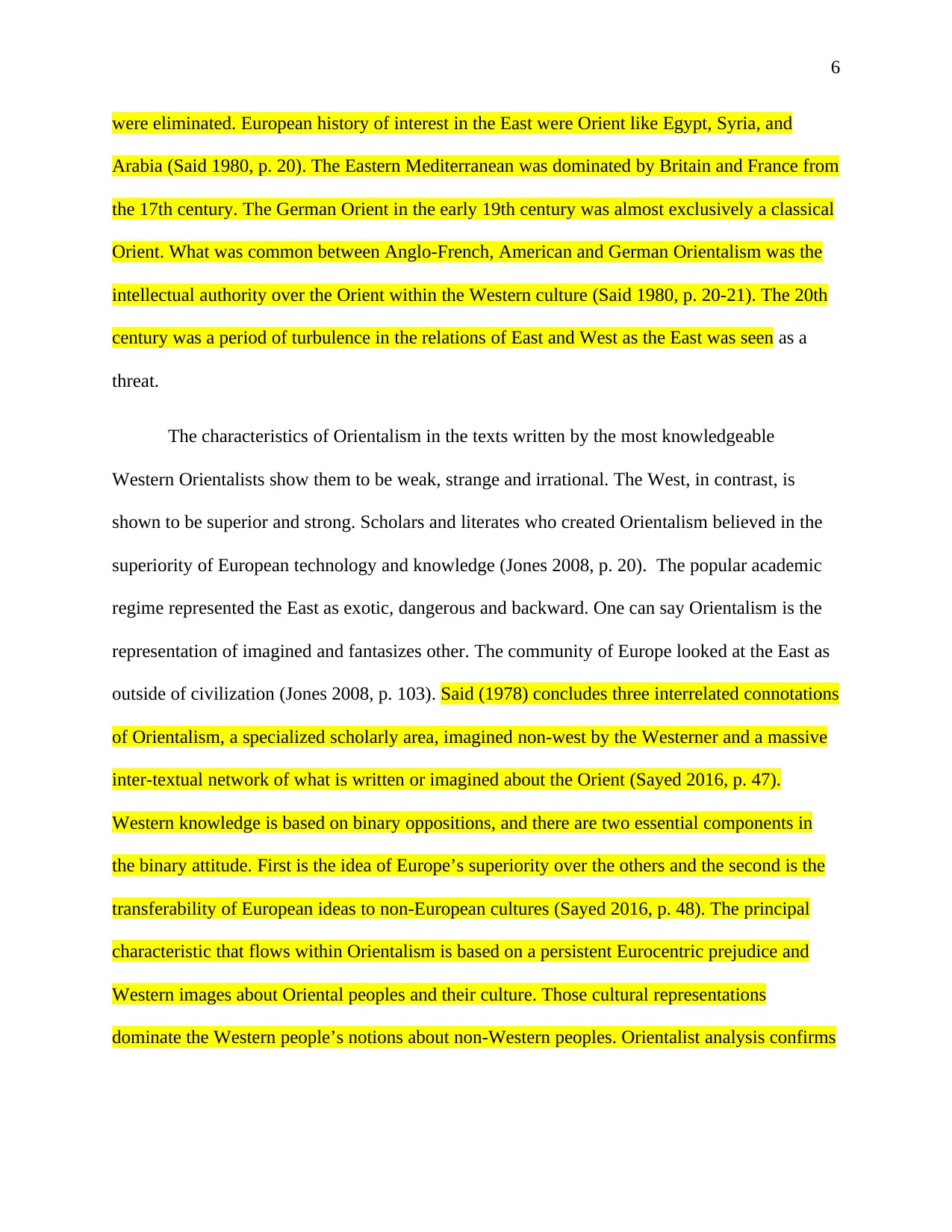
6
were eliminated. European history of interest in the East were Orient like Egypt, Syria, and
Arabia (Said 1980, p. 20). The Eastern Mediterranean was dominated by Britain and France from
the 17th century. The German Orient in the early 19th century was almost exclusively a classical
Orient. What was common between Anglo-French, American and German Orientalism was the
intellectual authority over the Orient within the Western culture (Said 1980, p. 20-21). The 20th
century was a period of turbulence in the relations of East and West as the East was seen as a
threat.
The characteristics of Orientalism in the texts written by the most knowledgeable
Western Orientalists show them to be weak, strange and irrational. The West, in contrast, is
shown to be superior and strong. Scholars and literates who created Orientalism believed in the
superiority of European technology and knowledge (Jones 2008, p. 20). The popular academic
regime represented the East as exotic, dangerous and backward. One can say Orientalism is the
representation of imagined and fantasizes other. The community of Europe looked at the East as
outside of civilization (Jones 2008, p. 103). Said (1978) concludes three interrelated connotations
of Orientalism, a specialized scholarly area, imagined non-west by the Westerner and a massive
inter-textual network of what is written or imagined about the Orient (Sayed 2016, p. 47).
Western knowledge is based on binary oppositions, and there are two essential components in
the binary attitude. First is the idea of Europe’s superiority over the others and the second is the
transferability of European ideas to non-European cultures (Sayed 2016, p. 48). The principal
characteristic that flows within Orientalism is based on a persistent Eurocentric prejudice and
Western images about Oriental peoples and their culture. Those cultural representations
dominate the Western people’s notions about non-Western peoples. Orientalist analysis confirms
were eliminated. European history of interest in the East were Orient like Egypt, Syria, and
Arabia (Said 1980, p. 20). The Eastern Mediterranean was dominated by Britain and France from
the 17th century. The German Orient in the early 19th century was almost exclusively a classical
Orient. What was common between Anglo-French, American and German Orientalism was the
intellectual authority over the Orient within the Western culture (Said 1980, p. 20-21). The 20th
century was a period of turbulence in the relations of East and West as the East was seen as a
threat.
The characteristics of Orientalism in the texts written by the most knowledgeable
Western Orientalists show them to be weak, strange and irrational. The West, in contrast, is
shown to be superior and strong. Scholars and literates who created Orientalism believed in the
superiority of European technology and knowledge (Jones 2008, p. 20). The popular academic
regime represented the East as exotic, dangerous and backward. One can say Orientalism is the
representation of imagined and fantasizes other. The community of Europe looked at the East as
outside of civilization (Jones 2008, p. 103). Said (1978) concludes three interrelated connotations
of Orientalism, a specialized scholarly area, imagined non-west by the Westerner and a massive
inter-textual network of what is written or imagined about the Orient (Sayed 2016, p. 47).
Western knowledge is based on binary oppositions, and there are two essential components in
the binary attitude. First is the idea of Europe’s superiority over the others and the second is the
transferability of European ideas to non-European cultures (Sayed 2016, p. 48). The principal
characteristic that flows within Orientalism is based on a persistent Eurocentric prejudice and
Western images about Oriental peoples and their culture. Those cultural representations
dominate the Western people’s notions about non-Western peoples. Orientalist analysis confirms
⊘ This is a preview!⊘
Do you want full access?
Subscribe today to unlock all pages.

Trusted by 1+ million students worldwide
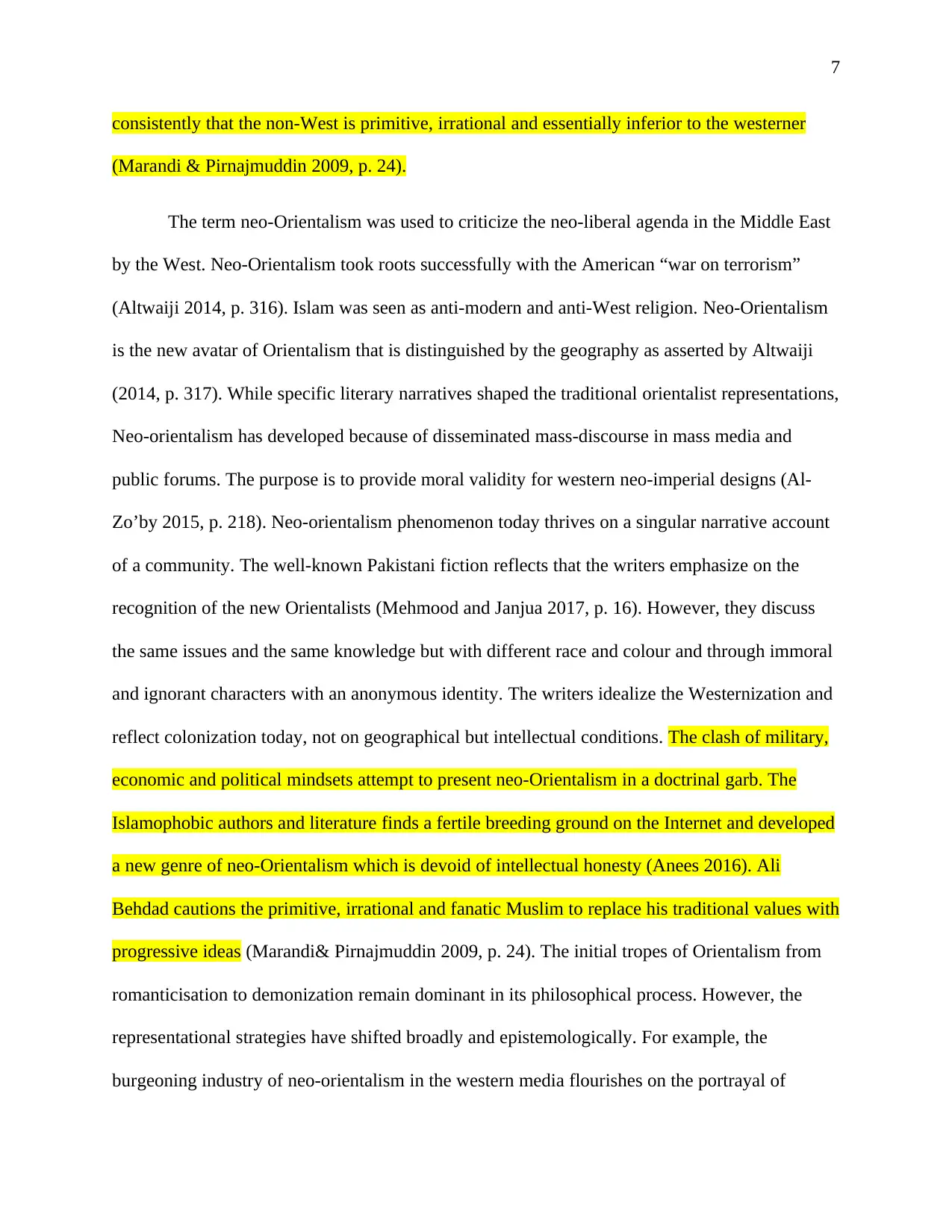
7
consistently that the non-West is primitive, irrational and essentially inferior to the westerner
(Marandi & Pirnajmuddin 2009, p. 24).
The term neo-Orientalism was used to criticize the neo-liberal agenda in the Middle East
by the West. Neo-Orientalism took roots successfully with the American “war on terrorism”
(Altwaiji 2014, p. 316). Islam was seen as anti-modern and anti-West religion. Neo-Orientalism
is the new avatar of Orientalism that is distinguished by the geography as asserted by Altwaiji
(2014, p. 317). While specific literary narratives shaped the traditional orientalist representations,
Neo-orientalism has developed because of disseminated mass-discourse in mass media and
public forums. The purpose is to provide moral validity for western neo-imperial designs (Al-
Zo’by 2015, p. 218). Neo-orientalism phenomenon today thrives on a singular narrative account
of a community. The well-known Pakistani fiction reflects that the writers emphasize on the
recognition of the new Orientalists (Mehmood and Janjua 2017, p. 16). However, they discuss
the same issues and the same knowledge but with different race and colour and through immoral
and ignorant characters with an anonymous identity. The writers idealize the Westernization and
reflect colonization today, not on geographical but intellectual conditions. The clash of military,
economic and political mindsets attempt to present neo-Orientalism in a doctrinal garb. The
Islamophobic authors and literature finds a fertile breeding ground on the Internet and developed
a new genre of neo-Orientalism which is devoid of intellectual honesty (Anees 2016). Ali
Behdad cautions the primitive, irrational and fanatic Muslim to replace his traditional values with
progressive ideas (Marandi& Pirnajmuddin 2009, p. 24). The initial tropes of Orientalism from
romanticisation to demonization remain dominant in its philosophical process. However, the
representational strategies have shifted broadly and epistemologically. For example, the
burgeoning industry of neo-orientalism in the western media flourishes on the portrayal of
consistently that the non-West is primitive, irrational and essentially inferior to the westerner
(Marandi & Pirnajmuddin 2009, p. 24).
The term neo-Orientalism was used to criticize the neo-liberal agenda in the Middle East
by the West. Neo-Orientalism took roots successfully with the American “war on terrorism”
(Altwaiji 2014, p. 316). Islam was seen as anti-modern and anti-West religion. Neo-Orientalism
is the new avatar of Orientalism that is distinguished by the geography as asserted by Altwaiji
(2014, p. 317). While specific literary narratives shaped the traditional orientalist representations,
Neo-orientalism has developed because of disseminated mass-discourse in mass media and
public forums. The purpose is to provide moral validity for western neo-imperial designs (Al-
Zo’by 2015, p. 218). Neo-orientalism phenomenon today thrives on a singular narrative account
of a community. The well-known Pakistani fiction reflects that the writers emphasize on the
recognition of the new Orientalists (Mehmood and Janjua 2017, p. 16). However, they discuss
the same issues and the same knowledge but with different race and colour and through immoral
and ignorant characters with an anonymous identity. The writers idealize the Westernization and
reflect colonization today, not on geographical but intellectual conditions. The clash of military,
economic and political mindsets attempt to present neo-Orientalism in a doctrinal garb. The
Islamophobic authors and literature finds a fertile breeding ground on the Internet and developed
a new genre of neo-Orientalism which is devoid of intellectual honesty (Anees 2016). Ali
Behdad cautions the primitive, irrational and fanatic Muslim to replace his traditional values with
progressive ideas (Marandi& Pirnajmuddin 2009, p. 24). The initial tropes of Orientalism from
romanticisation to demonization remain dominant in its philosophical process. However, the
representational strategies have shifted broadly and epistemologically. For example, the
burgeoning industry of neo-orientalism in the western media flourishes on the portrayal of
Paraphrase This Document
Need a fresh take? Get an instant paraphrase of this document with our AI Paraphraser
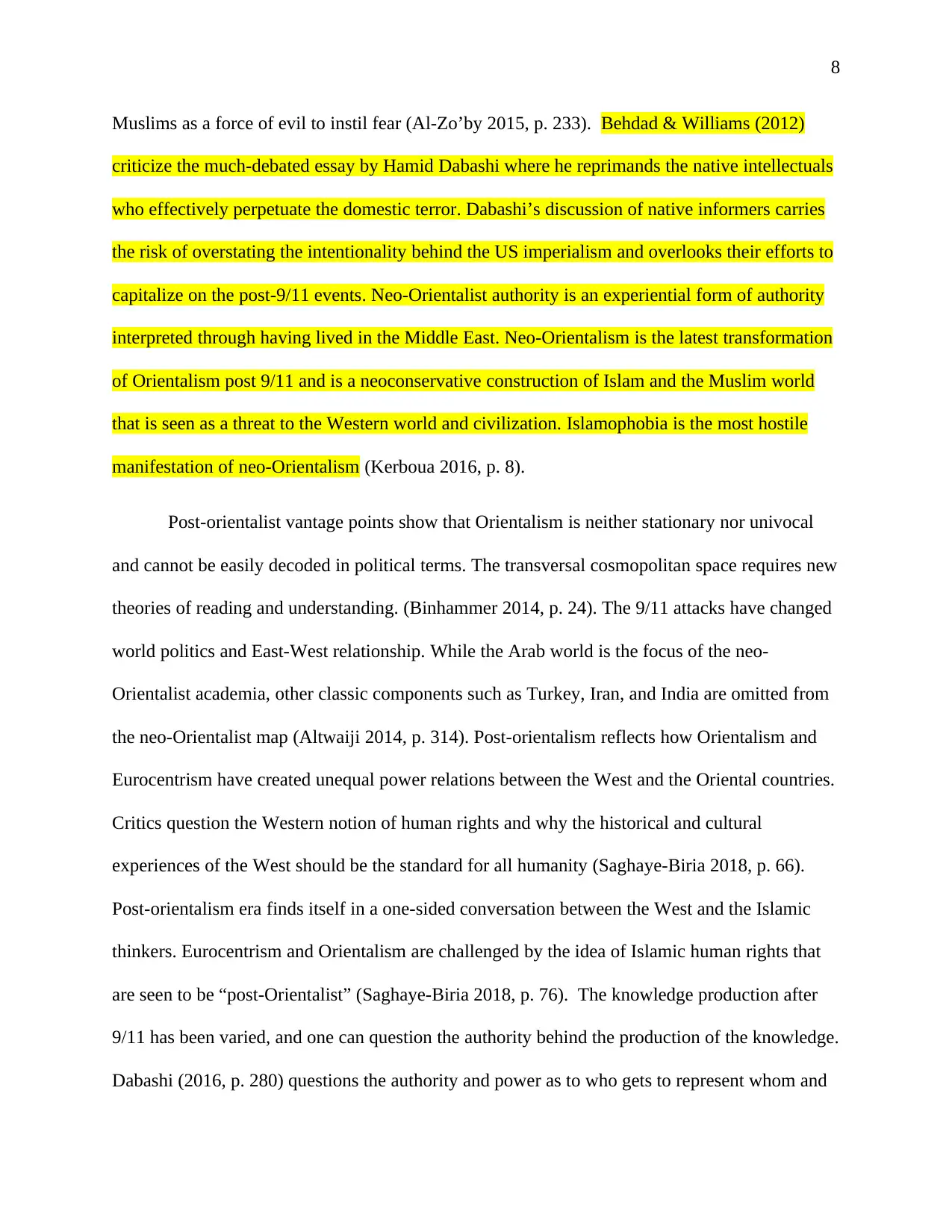
8
Muslims as a force of evil to instil fear (Al-Zo’by 2015, p. 233). Behdad & Williams (2012)
criticize the much-debated essay by Hamid Dabashi where he reprimands the native intellectuals
who effectively perpetuate the domestic terror. Dabashi’s discussion of native informers carries
the risk of overstating the intentionality behind the US imperialism and overlooks their efforts to
capitalize on the post-9/11 events. Neo-Orientalist authority is an experiential form of authority
interpreted through having lived in the Middle East. Neo-Orientalism is the latest transformation
of Orientalism post 9/11 and is a neoconservative construction of Islam and the Muslim world
that is seen as a threat to the Western world and civilization. Islamophobia is the most hostile
manifestation of neo-Orientalism (Kerboua 2016, p. 8).
Post-orientalist vantage points show that Orientalism is neither stationary nor univocal
and cannot be easily decoded in political terms. The transversal cosmopolitan space requires new
theories of reading and understanding. (Binhammer 2014, p. 24). The 9/11 attacks have changed
world politics and East-West relationship. While the Arab world is the focus of the neo-
Orientalist academia, other classic components such as Turkey, Iran, and India are omitted from
the neo-Orientalist map (Altwaiji 2014, p. 314). Post-orientalism reflects how Orientalism and
Eurocentrism have created unequal power relations between the West and the Oriental countries.
Critics question the Western notion of human rights and why the historical and cultural
experiences of the West should be the standard for all humanity (Saghaye-Biria 2018, p. 66).
Post-orientalism era finds itself in a one-sided conversation between the West and the Islamic
thinkers. Eurocentrism and Orientalism are challenged by the idea of Islamic human rights that
are seen to be “post-Orientalist” (Saghaye-Biria 2018, p. 76). The knowledge production after
9/11 has been varied, and one can question the authority behind the production of the knowledge.
Dabashi (2016, p. 280) questions the authority and power as to who gets to represent whom and
Muslims as a force of evil to instil fear (Al-Zo’by 2015, p. 233). Behdad & Williams (2012)
criticize the much-debated essay by Hamid Dabashi where he reprimands the native intellectuals
who effectively perpetuate the domestic terror. Dabashi’s discussion of native informers carries
the risk of overstating the intentionality behind the US imperialism and overlooks their efforts to
capitalize on the post-9/11 events. Neo-Orientalist authority is an experiential form of authority
interpreted through having lived in the Middle East. Neo-Orientalism is the latest transformation
of Orientalism post 9/11 and is a neoconservative construction of Islam and the Muslim world
that is seen as a threat to the Western world and civilization. Islamophobia is the most hostile
manifestation of neo-Orientalism (Kerboua 2016, p. 8).
Post-orientalist vantage points show that Orientalism is neither stationary nor univocal
and cannot be easily decoded in political terms. The transversal cosmopolitan space requires new
theories of reading and understanding. (Binhammer 2014, p. 24). The 9/11 attacks have changed
world politics and East-West relationship. While the Arab world is the focus of the neo-
Orientalist academia, other classic components such as Turkey, Iran, and India are omitted from
the neo-Orientalist map (Altwaiji 2014, p. 314). Post-orientalism reflects how Orientalism and
Eurocentrism have created unequal power relations between the West and the Oriental countries.
Critics question the Western notion of human rights and why the historical and cultural
experiences of the West should be the standard for all humanity (Saghaye-Biria 2018, p. 66).
Post-orientalism era finds itself in a one-sided conversation between the West and the Islamic
thinkers. Eurocentrism and Orientalism are challenged by the idea of Islamic human rights that
are seen to be “post-Orientalist” (Saghaye-Biria 2018, p. 76). The knowledge production after
9/11 has been varied, and one can question the authority behind the production of the knowledge.
Dabashi (2016, p. 280) questions the authority and power as to who gets to represent whom and
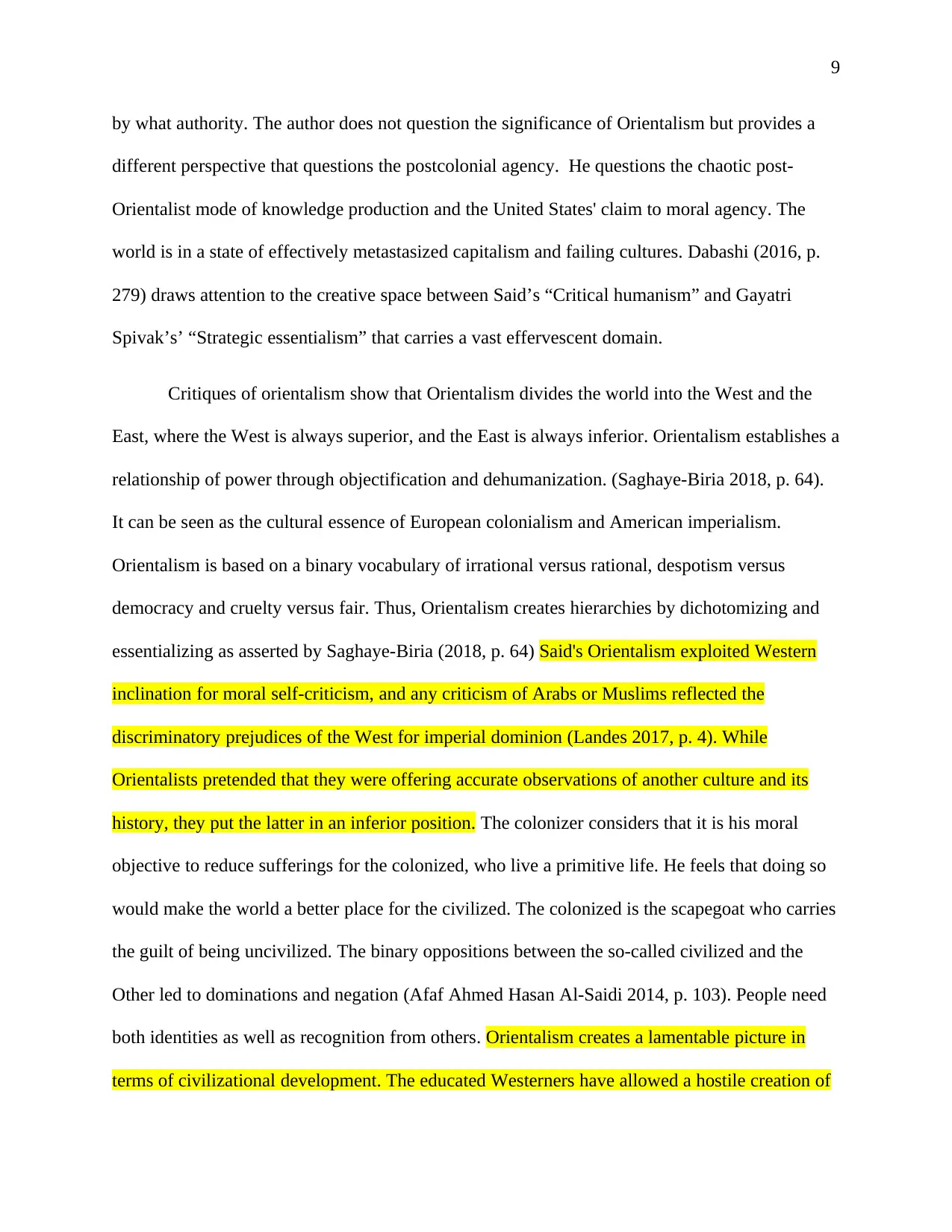
9
by what authority. The author does not question the significance of Orientalism but provides a
different perspective that questions the postcolonial agency. He questions the chaotic post-
Orientalist mode of knowledge production and the United States' claim to moral agency. The
world is in a state of effectively metastasized capitalism and failing cultures. Dabashi (2016, p.
279) draws attention to the creative space between Said’s “Critical humanism” and Gayatri
Spivak’s’ “Strategic essentialism” that carries a vast effervescent domain.
Critiques of orientalism show that Orientalism divides the world into the West and the
East, where the West is always superior, and the East is always inferior. Orientalism establishes a
relationship of power through objectification and dehumanization. (Saghaye-Biria 2018, p. 64).
It can be seen as the cultural essence of European colonialism and American imperialism.
Orientalism is based on a binary vocabulary of irrational versus rational, despotism versus
democracy and cruelty versus fair. Thus, Orientalism creates hierarchies by dichotomizing and
essentializing as asserted by Saghaye-Biria (2018, p. 64) Said's Orientalism exploited Western
inclination for moral self-criticism, and any criticism of Arabs or Muslims reflected the
discriminatory prejudices of the West for imperial dominion (Landes 2017, p. 4). While
Orientalists pretended that they were offering accurate observations of another culture and its
history, they put the latter in an inferior position. The colonizer considers that it is his moral
objective to reduce sufferings for the colonized, who live a primitive life. He feels that doing so
would make the world a better place for the civilized. The colonized is the scapegoat who carries
the guilt of being uncivilized. The binary oppositions between the so-called civilized and the
Other led to dominations and negation (Afaf Ahmed Hasan Al-Saidi 2014, p. 103). People need
both identities as well as recognition from others. Orientalism creates a lamentable picture in
terms of civilizational development. The educated Westerners have allowed a hostile creation of
by what authority. The author does not question the significance of Orientalism but provides a
different perspective that questions the postcolonial agency. He questions the chaotic post-
Orientalist mode of knowledge production and the United States' claim to moral agency. The
world is in a state of effectively metastasized capitalism and failing cultures. Dabashi (2016, p.
279) draws attention to the creative space between Said’s “Critical humanism” and Gayatri
Spivak’s’ “Strategic essentialism” that carries a vast effervescent domain.
Critiques of orientalism show that Orientalism divides the world into the West and the
East, where the West is always superior, and the East is always inferior. Orientalism establishes a
relationship of power through objectification and dehumanization. (Saghaye-Biria 2018, p. 64).
It can be seen as the cultural essence of European colonialism and American imperialism.
Orientalism is based on a binary vocabulary of irrational versus rational, despotism versus
democracy and cruelty versus fair. Thus, Orientalism creates hierarchies by dichotomizing and
essentializing as asserted by Saghaye-Biria (2018, p. 64) Said's Orientalism exploited Western
inclination for moral self-criticism, and any criticism of Arabs or Muslims reflected the
discriminatory prejudices of the West for imperial dominion (Landes 2017, p. 4). While
Orientalists pretended that they were offering accurate observations of another culture and its
history, they put the latter in an inferior position. The colonizer considers that it is his moral
objective to reduce sufferings for the colonized, who live a primitive life. He feels that doing so
would make the world a better place for the civilized. The colonized is the scapegoat who carries
the guilt of being uncivilized. The binary oppositions between the so-called civilized and the
Other led to dominations and negation (Afaf Ahmed Hasan Al-Saidi 2014, p. 103). People need
both identities as well as recognition from others. Orientalism creates a lamentable picture in
terms of civilizational development. The educated Westerners have allowed a hostile creation of
⊘ This is a preview!⊘
Do you want full access?
Subscribe today to unlock all pages.

Trusted by 1+ million students worldwide
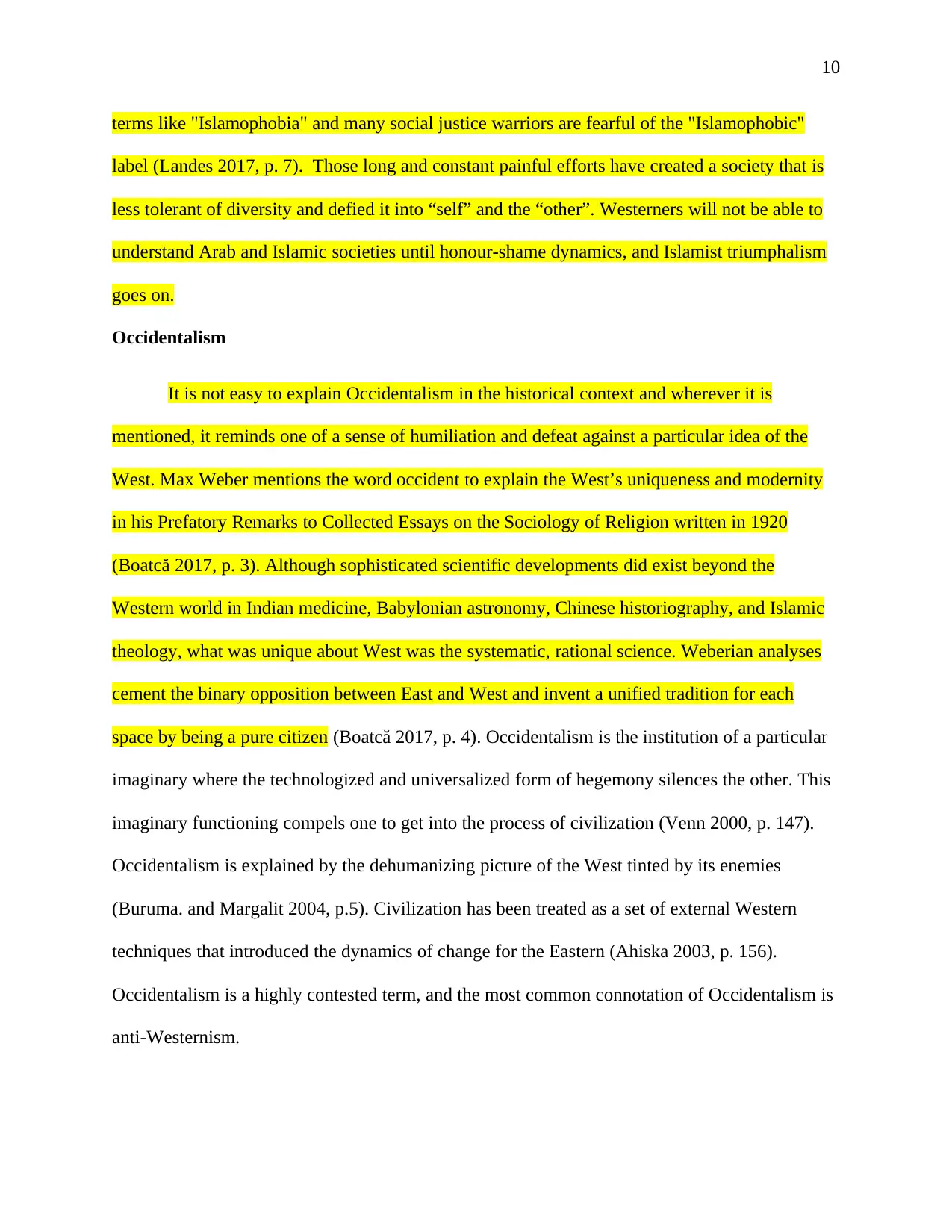
10
terms like "Islamophobia" and many social justice warriors are fearful of the "Islamophobic"
label (Landes 2017, p. 7). Those long and constant painful efforts have created a society that is
less tolerant of diversity and defied it into “self” and the “other”. Westerners will not be able to
understand Arab and Islamic societies until honour-shame dynamics, and Islamist triumphalism
goes on.
Occidentalism
It is not easy to explain Occidentalism in the historical context and wherever it is
mentioned, it reminds one of a sense of humiliation and defeat against a particular idea of the
West. Max Weber mentions the word occident to explain the West’s uniqueness and modernity
in his Prefatory Remarks to Collected Essays on the Sociology of Religion written in 1920
(Boatcă 2017, p. 3). Although sophisticated scientific developments did exist beyond the
Western world in Indian medicine, Babylonian astronomy, Chinese historiography, and Islamic
theology, what was unique about West was the systematic, rational science. Weberian analyses
cement the binary opposition between East and West and invent a unified tradition for each
space by being a pure citizen (Boatcă 2017, p. 4). Occidentalism is the institution of a particular
imaginary where the technologized and universalized form of hegemony silences the other. This
imaginary functioning compels one to get into the process of civilization (Venn 2000, p. 147).
Occidentalism is explained by the dehumanizing picture of the West tinted by its enemies
(Buruma. and Margalit 2004, p.5). Civilization has been treated as a set of external Western
techniques that introduced the dynamics of change for the Eastern (Ahiska 2003, p. 156).
Occidentalism is a highly contested term, and the most common connotation of Occidentalism is
anti-Westernism.
terms like "Islamophobia" and many social justice warriors are fearful of the "Islamophobic"
label (Landes 2017, p. 7). Those long and constant painful efforts have created a society that is
less tolerant of diversity and defied it into “self” and the “other”. Westerners will not be able to
understand Arab and Islamic societies until honour-shame dynamics, and Islamist triumphalism
goes on.
Occidentalism
It is not easy to explain Occidentalism in the historical context and wherever it is
mentioned, it reminds one of a sense of humiliation and defeat against a particular idea of the
West. Max Weber mentions the word occident to explain the West’s uniqueness and modernity
in his Prefatory Remarks to Collected Essays on the Sociology of Religion written in 1920
(Boatcă 2017, p. 3). Although sophisticated scientific developments did exist beyond the
Western world in Indian medicine, Babylonian astronomy, Chinese historiography, and Islamic
theology, what was unique about West was the systematic, rational science. Weberian analyses
cement the binary opposition between East and West and invent a unified tradition for each
space by being a pure citizen (Boatcă 2017, p. 4). Occidentalism is the institution of a particular
imaginary where the technologized and universalized form of hegemony silences the other. This
imaginary functioning compels one to get into the process of civilization (Venn 2000, p. 147).
Occidentalism is explained by the dehumanizing picture of the West tinted by its enemies
(Buruma. and Margalit 2004, p.5). Civilization has been treated as a set of external Western
techniques that introduced the dynamics of change for the Eastern (Ahiska 2003, p. 156).
Occidentalism is a highly contested term, and the most common connotation of Occidentalism is
anti-Westernism.
Paraphrase This Document
Need a fresh take? Get an instant paraphrase of this document with our AI Paraphraser
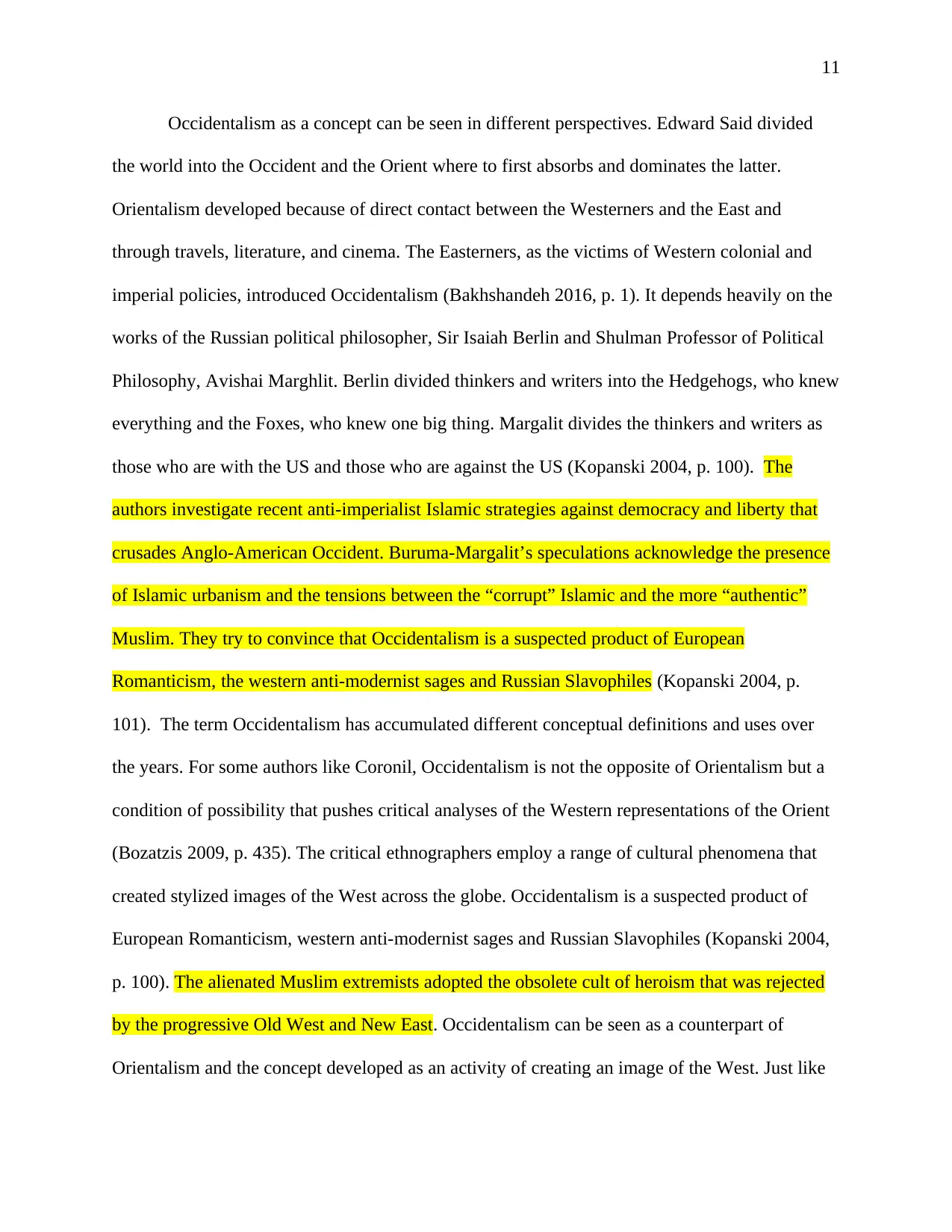
11
Occidentalism as a concept can be seen in different perspectives. Edward Said divided
the world into the Occident and the Orient where to first absorbs and dominates the latter.
Orientalism developed because of direct contact between the Westerners and the East and
through travels, literature, and cinema. The Easterners, as the victims of Western colonial and
imperial policies, introduced Occidentalism (Bakhshandeh 2016, p. 1). It depends heavily on the
works of the Russian political philosopher, Sir Isaiah Berlin and Shulman Professor of Political
Philosophy, Avishai Marghlit. Berlin divided thinkers and writers into the Hedgehogs, who knew
everything and the Foxes, who knew one big thing. Margalit divides the thinkers and writers as
those who are with the US and those who are against the US (Kopanski 2004, p. 100). The
authors investigate recent anti-imperialist Islamic strategies against democracy and liberty that
crusades Anglo-American Occident. Buruma-Margalit’s speculations acknowledge the presence
of Islamic urbanism and the tensions between the “corrupt” Islamic and the more “authentic”
Muslim. They try to convince that Occidentalism is a suspected product of European
Romanticism, the western anti-modernist sages and Russian Slavophiles (Kopanski 2004, p.
101). The term Occidentalism has accumulated different conceptual definitions and uses over
the years. For some authors like Coronil, Occidentalism is not the opposite of Orientalism but a
condition of possibility that pushes critical analyses of the Western representations of the Orient
(Bozatzis 2009, p. 435). The critical ethnographers employ a range of cultural phenomena that
created stylized images of the West across the globe. Occidentalism is a suspected product of
European Romanticism, western anti-modernist sages and Russian Slavophiles (Kopanski 2004,
p. 100). The alienated Muslim extremists adopted the obsolete cult of heroism that was rejected
by the progressive Old West and New East. Occidentalism can be seen as a counterpart of
Orientalism and the concept developed as an activity of creating an image of the West. Just like
Occidentalism as a concept can be seen in different perspectives. Edward Said divided
the world into the Occident and the Orient where to first absorbs and dominates the latter.
Orientalism developed because of direct contact between the Westerners and the East and
through travels, literature, and cinema. The Easterners, as the victims of Western colonial and
imperial policies, introduced Occidentalism (Bakhshandeh 2016, p. 1). It depends heavily on the
works of the Russian political philosopher, Sir Isaiah Berlin and Shulman Professor of Political
Philosophy, Avishai Marghlit. Berlin divided thinkers and writers into the Hedgehogs, who knew
everything and the Foxes, who knew one big thing. Margalit divides the thinkers and writers as
those who are with the US and those who are against the US (Kopanski 2004, p. 100). The
authors investigate recent anti-imperialist Islamic strategies against democracy and liberty that
crusades Anglo-American Occident. Buruma-Margalit’s speculations acknowledge the presence
of Islamic urbanism and the tensions between the “corrupt” Islamic and the more “authentic”
Muslim. They try to convince that Occidentalism is a suspected product of European
Romanticism, the western anti-modernist sages and Russian Slavophiles (Kopanski 2004, p.
101). The term Occidentalism has accumulated different conceptual definitions and uses over
the years. For some authors like Coronil, Occidentalism is not the opposite of Orientalism but a
condition of possibility that pushes critical analyses of the Western representations of the Orient
(Bozatzis 2009, p. 435). The critical ethnographers employ a range of cultural phenomena that
created stylized images of the West across the globe. Occidentalism is a suspected product of
European Romanticism, western anti-modernist sages and Russian Slavophiles (Kopanski 2004,
p. 100). The alienated Muslim extremists adopted the obsolete cult of heroism that was rejected
by the progressive Old West and New East. Occidentalism can be seen as a counterpart of
Orientalism and the concept developed as an activity of creating an image of the West. Just like
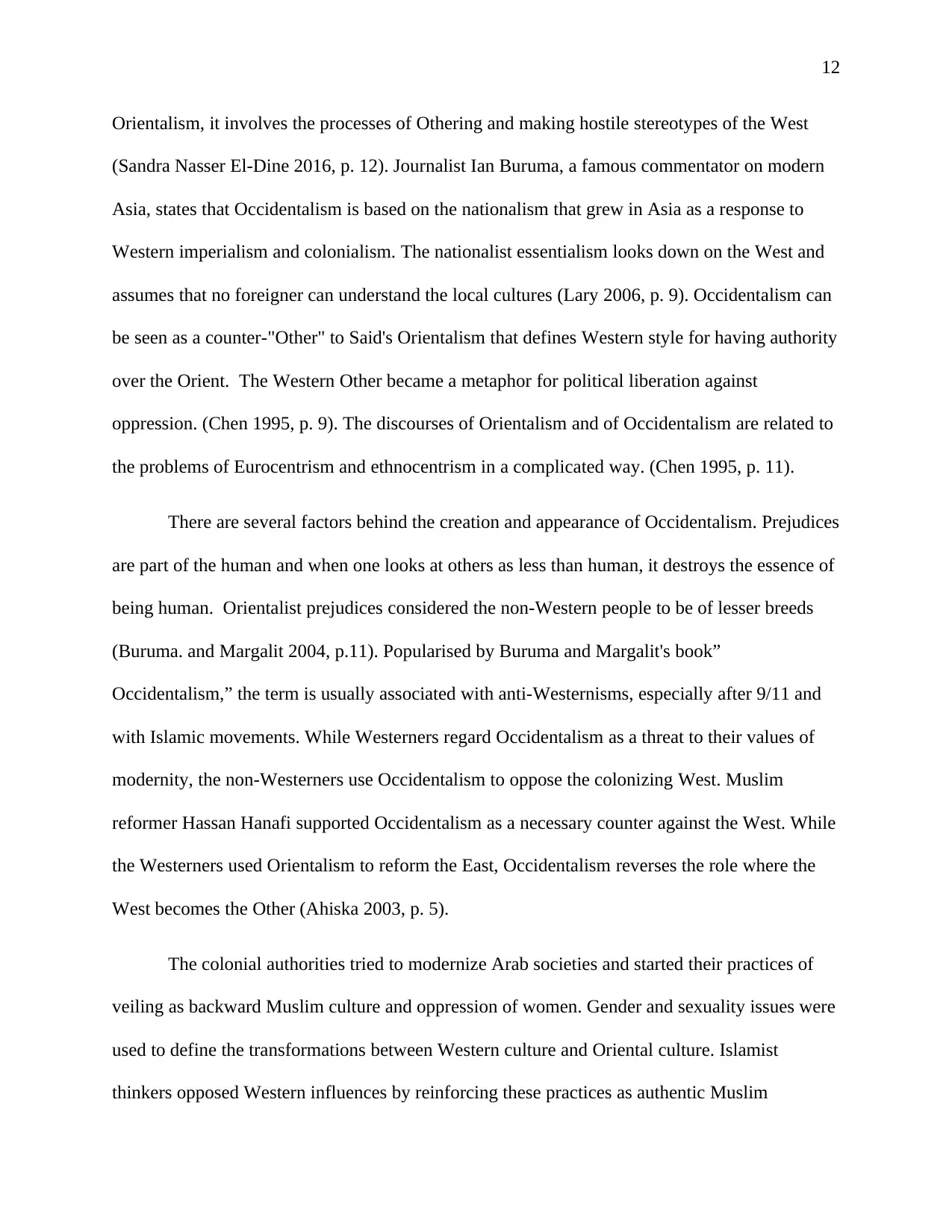
12
Orientalism, it involves the processes of Othering and making hostile stereotypes of the West
(Sandra Nasser El-Dine 2016, p. 12). Journalist Ian Buruma, a famous commentator on modern
Asia, states that Occidentalism is based on the nationalism that grew in Asia as a response to
Western imperialism and colonialism. The nationalist essentialism looks down on the West and
assumes that no foreigner can understand the local cultures (Lary 2006, p. 9). Occidentalism can
be seen as a counter-"Other" to Said's Orientalism that defines Western style for having authority
over the Orient. The Western Other became a metaphor for political liberation against
oppression. (Chen 1995, p. 9). The discourses of Orientalism and of Occidentalism are related to
the problems of Eurocentrism and ethnocentrism in a complicated way. (Chen 1995, p. 11).
There are several factors behind the creation and appearance of Occidentalism. Prejudices
are part of the human and when one looks at others as less than human, it destroys the essence of
being human. Orientalist prejudices considered the non-Western people to be of lesser breeds
(Buruma. and Margalit 2004, p.11). Popularised by Buruma and Margalit's book”
Occidentalism,” the term is usually associated with anti-Westernisms, especially after 9/11 and
with Islamic movements. While Westerners regard Occidentalism as a threat to their values of
modernity, the non-Westerners use Occidentalism to oppose the colonizing West. Muslim
reformer Hassan Hanafi supported Occidentalism as a necessary counter against the West. While
the Westerners used Orientalism to reform the East, Occidentalism reverses the role where the
West becomes the Other (Ahiska 2003, p. 5).
The colonial authorities tried to modernize Arab societies and started their practices of
veiling as backward Muslim culture and oppression of women. Gender and sexuality issues were
used to define the transformations between Western culture and Oriental culture. Islamist
thinkers opposed Western influences by reinforcing these practices as authentic Muslim
Orientalism, it involves the processes of Othering and making hostile stereotypes of the West
(Sandra Nasser El-Dine 2016, p. 12). Journalist Ian Buruma, a famous commentator on modern
Asia, states that Occidentalism is based on the nationalism that grew in Asia as a response to
Western imperialism and colonialism. The nationalist essentialism looks down on the West and
assumes that no foreigner can understand the local cultures (Lary 2006, p. 9). Occidentalism can
be seen as a counter-"Other" to Said's Orientalism that defines Western style for having authority
over the Orient. The Western Other became a metaphor for political liberation against
oppression. (Chen 1995, p. 9). The discourses of Orientalism and of Occidentalism are related to
the problems of Eurocentrism and ethnocentrism in a complicated way. (Chen 1995, p. 11).
There are several factors behind the creation and appearance of Occidentalism. Prejudices
are part of the human and when one looks at others as less than human, it destroys the essence of
being human. Orientalist prejudices considered the non-Western people to be of lesser breeds
(Buruma. and Margalit 2004, p.11). Popularised by Buruma and Margalit's book”
Occidentalism,” the term is usually associated with anti-Westernisms, especially after 9/11 and
with Islamic movements. While Westerners regard Occidentalism as a threat to their values of
modernity, the non-Westerners use Occidentalism to oppose the colonizing West. Muslim
reformer Hassan Hanafi supported Occidentalism as a necessary counter against the West. While
the Westerners used Orientalism to reform the East, Occidentalism reverses the role where the
West becomes the Other (Ahiska 2003, p. 5).
The colonial authorities tried to modernize Arab societies and started their practices of
veiling as backward Muslim culture and oppression of women. Gender and sexuality issues were
used to define the transformations between Western culture and Oriental culture. Islamist
thinkers opposed Western influences by reinforcing these practices as authentic Muslim
⊘ This is a preview!⊘
Do you want full access?
Subscribe today to unlock all pages.

Trusted by 1+ million students worldwide
1 out of 20
Your All-in-One AI-Powered Toolkit for Academic Success.
+13062052269
info@desklib.com
Available 24*7 on WhatsApp / Email
![[object Object]](/_next/static/media/star-bottom.7253800d.svg)
Unlock your academic potential
Copyright © 2020–2026 A2Z Services. All Rights Reserved. Developed and managed by ZUCOL.

